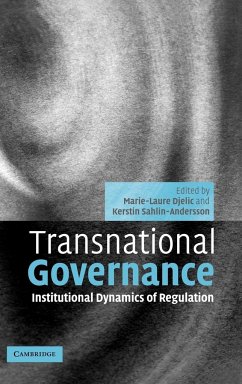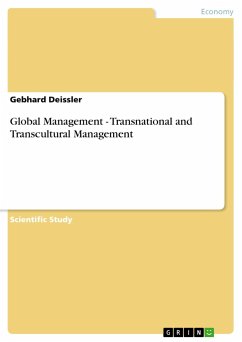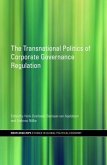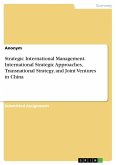An authoritative analysis of the emergence and operation of new forms of regulation.
Globalization involves a profound re-ordering of our world with the proliferation everywhere of rules and transnational modes of governance. This book examines how this governance is formed, changes and stabilizes. Building on a rich and varied set of empirical cases, it explores transnational rules and regulations and the organizing, discursive and monitoring activities that frame, sustain and reproduce them. Beginning from an understanding of the powerful structuring forces that embed and form the context of transnational regulatory activities, the book scrutinizes the actors involved, how they are organized, how they interact and how they transform themselves to adapt to this new regulatory landscape. A powerful analysis of the modes and logics of transnational rule-making and rule-monitoring closes the book. This authoritative resource offers ideal reading for all academic researchers and graduate students of governance and regulation.
Review quote:
'National regimes which have long held sway over most arenas of political, economic, and social life are being supplemented and challenged by the rise of a multitude of transnational institutions. This welcome volume by an international group of scholars explores where, how and by whom these influential new governance systems are being constructed.' W. Richard Scott, Professor Emeritus, Stanford University
'Karl Polanyi argued sixty years ago that the development of national capitalism required increasing levels of regulation. Transnational Governance shows impressively that the same thing is happening today at the international level. With the rise of globalization, nation-states, NGOs, central bankers, multinational corporations, and others are developing a host of new international modes of regulation and governance. This insightful volume will be of great interest to sociologists, political scientists, and organization.' John L. Campbell, Class of 1925 Professor, Dartmouth College, and Professor of Political Economy, Copenhagen Business School
'From a world society perspective and with a rich set of case studies this intriguing volume traces how transnational governance is emerging as a vital field of innovative scholarship and a vigorous domain of regulatory politics.' Peter J. Katzenstein, Walter S. Carpenter, Jr. Professor of International Studies, Cornell University
'Rule making has exploded everywhere. National boundaries and institutions are challenged by transnational networks of agents creating new norms of governance. World level organizations increasingly reorder traditional regulatory patterns and communities of expert practice, and the distinction between managerial and regulatory action is no longer clear. In this collection, Djelic and Sahlin-Andersson have assembled an all star-cast to explore these different facets of the explosion in transnational regulation.' Michael Power, Professor of Accounting and a Director of the ESRC Centre for the Analysis of Risk and Regulations (CARR), London School of Economics
Table of contents:
Figures; Tables; Acronyms; Contributors; Acknowledgements; Introduction: a world of governance - the rise of transnational regulation Marie-Laure Djelic and Kerstin Sahlin-Andersson; Part I. Institutional Forces: 2. Scientization: making a world safe for organizing Gili S. Drori and John W. Meyer; 3. Marketization: from intellectual agenda to global policy making Marie-Laure Djelic; 4. Organizing the world Göran Ahrne and Nils Brunsson; 5. The rationalization of virtue and virtuosity in world society John Boli; 6. Soft regulation and global democracy Ulrika Mörth; Part II. A Dynamic Transnational Topography: 7. Transnational actors, transnational institutions, transnational spaces: the role of law firms in the internationalization of competition regulation Glenn Morgan; 8. Global enterprises in fields of governance Lars Engwall; 9. The transnational governance network of central bankers Martin Marcussen; 10. Regulated regulations: global trends of state transformation Bengt Jacobsson; 11. The rationalization of universities Francisco O. Ramirez; III. Transnational Governance in the Making: 12. Dynamics of soft regulations Bengt Jacobsson and Kerstin Sahlin-Andersson; 13. Contested rules and shifting boundaries: international standard setting in accounting Sebastian Botzem and Sigrid Quack; 14. The international competition network - moving towards transnational governance Marie-Laure Djelic and Thibaut Kleiner; 15. The emergence of a European regulatory field of management education Tina Hedmo, Kerstin Sahlin-Andersson and Linda Wedlin; 16. Market creation and transnational rule-making: the case of CO2 emissions trading Anita Engels; 17. Transnational BGO certification programs as new regulatory forms: lessons from the forestry sector Jason McNichol; IV. Conclusions: 18. Institutional dynamics in a re-ordering world Marie-Laure Djelic and Kerstin Sahlin-Andersson.
Hinweis: Dieser Artikel kann nur an eine deutsche Lieferadresse ausgeliefert werden.
Globalization involves a profound re-ordering of our world with the proliferation everywhere of rules and transnational modes of governance. This book examines how this governance is formed, changes and stabilizes. Building on a rich and varied set of empirical cases, it explores transnational rules and regulations and the organizing, discursive and monitoring activities that frame, sustain and reproduce them. Beginning from an understanding of the powerful structuring forces that embed and form the context of transnational regulatory activities, the book scrutinizes the actors involved, how they are organized, how they interact and how they transform themselves to adapt to this new regulatory landscape. A powerful analysis of the modes and logics of transnational rule-making and rule-monitoring closes the book. This authoritative resource offers ideal reading for all academic researchers and graduate students of governance and regulation.
Review quote:
'National regimes which have long held sway over most arenas of political, economic, and social life are being supplemented and challenged by the rise of a multitude of transnational institutions. This welcome volume by an international group of scholars explores where, how and by whom these influential new governance systems are being constructed.' W. Richard Scott, Professor Emeritus, Stanford University
'Karl Polanyi argued sixty years ago that the development of national capitalism required increasing levels of regulation. Transnational Governance shows impressively that the same thing is happening today at the international level. With the rise of globalization, nation-states, NGOs, central bankers, multinational corporations, and others are developing a host of new international modes of regulation and governance. This insightful volume will be of great interest to sociologists, political scientists, and organization.' John L. Campbell, Class of 1925 Professor, Dartmouth College, and Professor of Political Economy, Copenhagen Business School
'From a world society perspective and with a rich set of case studies this intriguing volume traces how transnational governance is emerging as a vital field of innovative scholarship and a vigorous domain of regulatory politics.' Peter J. Katzenstein, Walter S. Carpenter, Jr. Professor of International Studies, Cornell University
'Rule making has exploded everywhere. National boundaries and institutions are challenged by transnational networks of agents creating new norms of governance. World level organizations increasingly reorder traditional regulatory patterns and communities of expert practice, and the distinction between managerial and regulatory action is no longer clear. In this collection, Djelic and Sahlin-Andersson have assembled an all star-cast to explore these different facets of the explosion in transnational regulation.' Michael Power, Professor of Accounting and a Director of the ESRC Centre for the Analysis of Risk and Regulations (CARR), London School of Economics
Table of contents:
Figures; Tables; Acronyms; Contributors; Acknowledgements; Introduction: a world of governance - the rise of transnational regulation Marie-Laure Djelic and Kerstin Sahlin-Andersson; Part I. Institutional Forces: 2. Scientization: making a world safe for organizing Gili S. Drori and John W. Meyer; 3. Marketization: from intellectual agenda to global policy making Marie-Laure Djelic; 4. Organizing the world Göran Ahrne and Nils Brunsson; 5. The rationalization of virtue and virtuosity in world society John Boli; 6. Soft regulation and global democracy Ulrika Mörth; Part II. A Dynamic Transnational Topography: 7. Transnational actors, transnational institutions, transnational spaces: the role of law firms in the internationalization of competition regulation Glenn Morgan; 8. Global enterprises in fields of governance Lars Engwall; 9. The transnational governance network of central bankers Martin Marcussen; 10. Regulated regulations: global trends of state transformation Bengt Jacobsson; 11. The rationalization of universities Francisco O. Ramirez; III. Transnational Governance in the Making: 12. Dynamics of soft regulations Bengt Jacobsson and Kerstin Sahlin-Andersson; 13. Contested rules and shifting boundaries: international standard setting in accounting Sebastian Botzem and Sigrid Quack; 14. The international competition network - moving towards transnational governance Marie-Laure Djelic and Thibaut Kleiner; 15. The emergence of a European regulatory field of management education Tina Hedmo, Kerstin Sahlin-Andersson and Linda Wedlin; 16. Market creation and transnational rule-making: the case of CO2 emissions trading Anita Engels; 17. Transnational BGO certification programs as new regulatory forms: lessons from the forestry sector Jason McNichol; IV. Conclusions: 18. Institutional dynamics in a re-ordering world Marie-Laure Djelic and Kerstin Sahlin-Andersson.
Hinweis: Dieser Artikel kann nur an eine deutsche Lieferadresse ausgeliefert werden.







